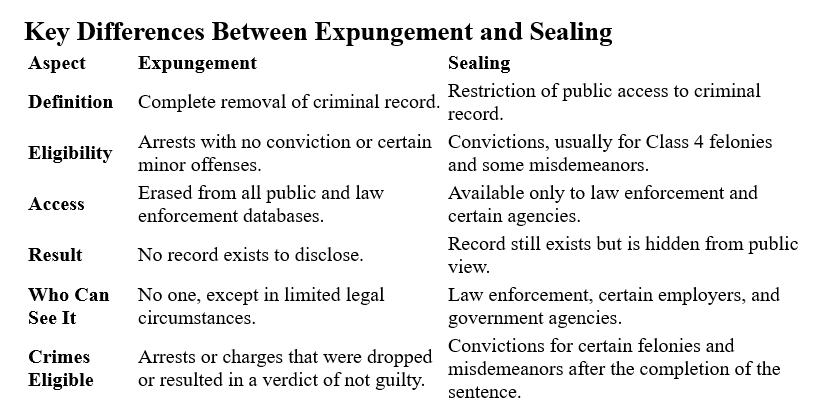Expunge & Seal Criminal Records in Illinois
Overview of Expungement and Sealing in Illinois
In Illinois, individuals who have been convicted or arrested for certain crimes may have the opportunity to clear or restrict access to their criminal records. Expungement and sealing are two legal processes that allow individuals to either remove or limit access to their criminal history, offering a second chance to move forward without the burden of past mistakes.
Whether you’ve been arrested but not convicted, completed your sentence, or were convicted of an offense that no longer reflects who you are, Illinois law provides options to help you clear your record. Understanding the differences between expungement and sealing, as well as the steps involved, is crucial in determining which process is right for you.
What is Expungement?
Expungement is the process of completely erasing a criminal record, as if the event never occurred. When a record is expunged, it is essentially destroyed, and the individual is legally allowed to deny the existence of the arrest or conviction.
Eligibility for Expungement: In Illinois, not all criminal records are eligible for expungement.
Typically, individuals may be eligible if:
- They were arrested but not convicted of a crime.
- Their case was dismissed, or they were found not guilty of the offense.
- They were found guilty, but not convicted, of relatively minor, non-violent offenses and meet other eligibility criteria.
Effect of Expungement: Once a record is expunged, it is removed from law enforcement databases, court records, and public databases. This means that the individual can legally state that they have never been arrested or convicted of the offense. However, there are some exceptions where expunged records may still be accessible, such as in future criminal cases or when applying for certain jobs in law enforcement or government.
What is Sealing?
Sealing is a process that restricts public access to criminal records but does not erase them entirely. A sealed record is hidden from the general public, including most employers and landlords, but still accessible to law enforcement and certain government agencies.
Eligibility for Sealing: In Illinois, many individuals with a conviction may be eligible for sealing, including:
- Individuals convicted of Class 4 felonies (the lowest-level felonies), as well as certain misdemeanors.
- Those who have completed their sentence, including probation, and have met any waiting period requirements.
- Individuals who have no other criminal convictions since the offense they wish to seal, and have maintained a clean record after completing their sentence.
Effect of Sealing: While sealed records are not publicly available, they are still accessible to law enforcement, certain employers (for positions requiring background checks), and state licensing agencies. However, sealing does provide individuals with more privacy and the ability to move forward without the constant reminder of a past conviction.
Key Differences Between Expungement and Sealing
How We Can Help
The process of expunging or sealing your criminal record can be complex, and it is often helpful to have legal assistance to ensure all the necessary steps are taken.
Our dynamic team of experienced attorneys at Lyon & Kerr can:
- Review your criminal record and assess eligibility for expungement or sealing.
- Help prepare and file the necessary petitions and documentation.
- Represent you in court hearings to advocate for your request.
- Answer any questions and guide you through the entire process.
You may also be eligible for other similar types of relief, including commutation or pardon, medical release, youthful parole.
Please contact Lyon & Kerr today to learn more about Expungement and Sealing, and to determine if you or your loved one is eligible for relief.


